There are several ways to get into a swimming pool; for inground pools with deeper depths especially- slide, dive, or belly flop, the choice is yours! But you have to allow swimmers a safe and easy way to exist the pool. For that you need at least one step (or a ladder). This will also be appreciated by those who prefer to ease into the pool instead of testing their cannonball skills.
For above ground pools, step or ladder options are pretty self-explanatory. In this article we’ll be looking at the step options for inground vinyl liner swimming pools.
Drop in Steps
First, the easiest step to address is the Drop In. Drop In steps are typically added to an existing pool that was built without steps. These are much more affordable than doing a major overhaul on the existing pool structure, and a quick way to provide easy entry compared to a typical ladder. There are several different styles and colors available. The most cost effective version is a molded plastic step that literally is just dropped into the pool. The more visually appealing option is a vinyl over drop in step that allows for seamless look. These are a great way to upgrade the look of your pool especially when it's about time to replace your liner as your liner would have to be remade to go over vinyl over steps anyway.
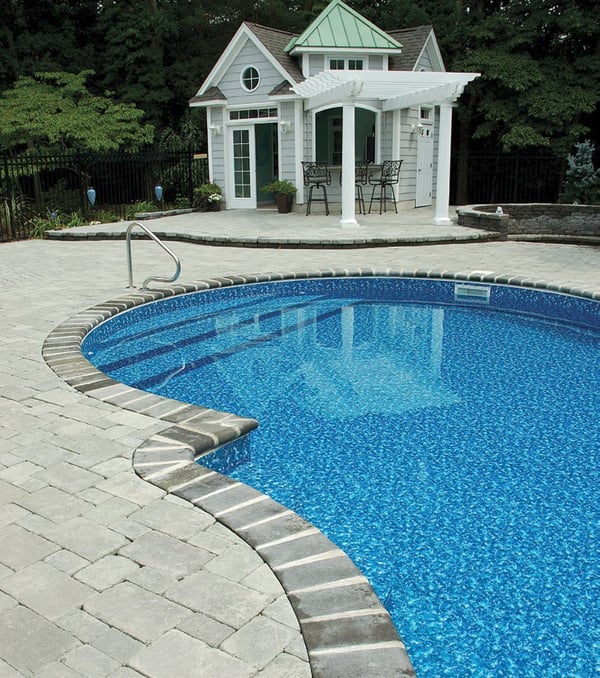
Bolt on Steps
The age-old step type for a vinyl liner pool is standard white plastic or fiberglass step. These steps, as the name implies, bolt onto your pool’s walls and are impressively durable. These common little darlings have come a long way over the years; now being offered in a variety of styles, colors, and material. They can be placed at almost any location in your pool’s shallow end, including the corner of your pool. They can also now jut away from your pool’s perimeter or be housed inside the main walls if choosing a cornerstep. Some of the style types offer seating options, with or without spa jets in them.
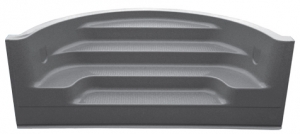
Depending on the step you choose, you can also decide if you want bull nose, or cantilever style to match your coping type.
TIP: Keep in mind that white steps will highlight any dirt or algae hanging out that area. For a more forgiving appearance, go with a colored step. Also, if you opt for bullnose coping we strongly suggest that you choose a color that is complimentary to your step, i.e. if you choose a gray step, gray coping looks the best. Blue steps would use either white or gray coping, although gray tends to look a little better. This will help ensure that your pool has a more cohesive look.
Check out the two images below to see the difference between bullnose coping on a step and cantilever coping over a step.
Bullnose Coping Step
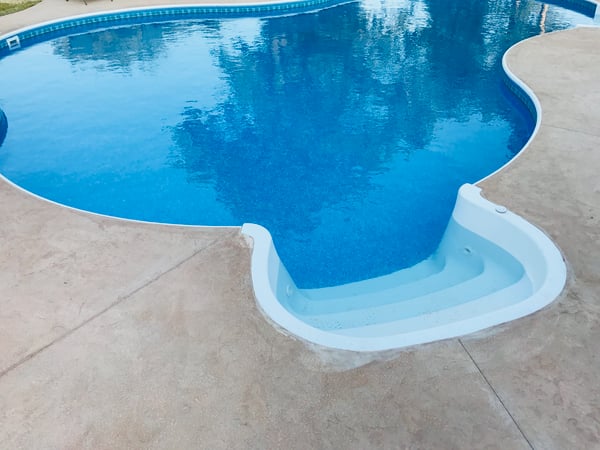
Cantilever Coping Over Step
.jpg?width=600&name=WON%20Denise%20Haas%20%20(6).jpg)
Vinyl Over Steps
While Bolt On steps have indeed come a long way, for a truly consistent look to your pool, as well as an elevated visual appeal, you’ll only want to opt for vinyl over steps. These are ideal for anyone wanting more of an expensive concrete/gunite look but with soft (and affordable) vinyl. 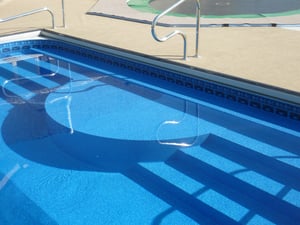 Vinyl Over steps are also well named, as they are designed for your liner to go over the steps themselves. This equals a much more attractive finish and the variety of options is nearly limitless. Your steps can be along a shallow wall, full pool width (with or without a sun ledge), in a corner, rounded or straight-edged, and more. Vinyl Over Steps most commonly sit inside the barriers of your pool’s walls instead of jutting out from your pool like the majority of bolt-on steps. However, there are many designs that are exterior to the pool which won't take up swim space. Plus, thanks to their flexible design as well as the advancement of vinyl technology over the years, you can add breathtaking features such as bubblers to your Vinyl Over Steps for that extra WOW-factor.
Vinyl Over steps are also well named, as they are designed for your liner to go over the steps themselves. This equals a much more attractive finish and the variety of options is nearly limitless. Your steps can be along a shallow wall, full pool width (with or without a sun ledge), in a corner, rounded or straight-edged, and more. Vinyl Over Steps most commonly sit inside the barriers of your pool’s walls instead of jutting out from your pool like the majority of bolt-on steps. However, there are many designs that are exterior to the pool which won't take up swim space. Plus, thanks to their flexible design as well as the advancement of vinyl technology over the years, you can add breathtaking features such as bubblers to your Vinyl Over Steps for that extra WOW-factor.
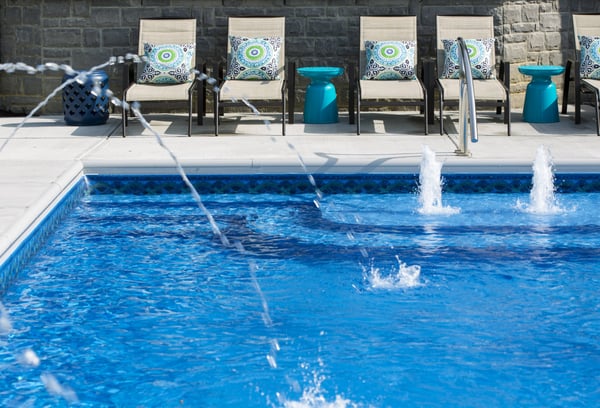
TIP: Vinyl Over doesn’t have to be limited to just “steps”. You can vinyl over nearly anything; from in-pool bar stools to deep-end benches. Let your imagination go wild!
Step Jets Vs Returns
The primary purpose of both returns and jets is to circulate your water, keeping your steps clean.
This is important as good water circulation allows your pool to filter properly and proper filtration keeps your pool clean and algae at bay. Algae will not be more or less common based on one type of step over another however, if your water isn’t balanced and you have poor general circulation, your steps may be the first place you see your new algae bloom. This is partly because algae likes to make its home in warm areas where it can bask in the sunshine. Your pool’s water is typically warmest on the top couple treads of your pool steps since the shallow water there heats up quicker. Aside from being yucky to look at, algae growth on steps can be dangerously slippery. This is why it’s important to keep your pool clean, brushed, and circulated.
You can equate your pool’s steps to the entryway of your home. You’ll have a higher level of traffic in this area so you’ll see more dirt and debris if you don’t prep it properly. Do you have a floor mat by your front door or a shoe basket to lessen the amount of debris/wear and tear in that high-traffic area? Your returns/jets do the same for your pool steps. They keep your steps from becoming a gathering place for dirt and rubbish.
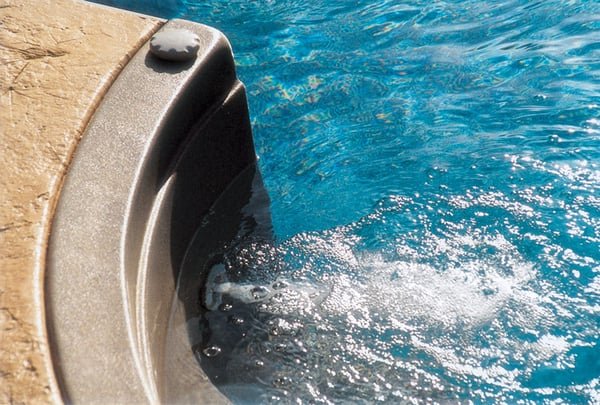
While both step returns and step jets circulate your pool’s water the only difference between the two is that a step jet offers an added layer of relaxation by including the benefits of hydrotherapy. You can use a step jet in place of a standard return and they come in a variety of colors to match your step. The CMP Deluxe pulsating massage jet for example comes in 6 different colors.
Tanning and Sun Ledges
One of the most popular step upgrades to include in when trying to enhance your pools visual aesthetics is to add a Tanning or Sun Ledge. These ledges offer an extended shallow area typically used for lounging but can double as a play area for smaller children. While there doesn’t appear to be an industry standard explaining the differences between these two ledge types, here at Royal we generally break them up based on where they would sit in the term of water depth.
A tanning ledge will sit in approximately 2-4” of water. This is the equal depth of the first tread from the top on your steps. As this is exceptionally shallow water it is hard to keep clean as it’s easier for algae to grow in the warm water and can become slick to step on so we do not recommend using the first step depth as your tanning/sun ledge.
The more favorable option is the sun ledge, which is equal to the second step level sitting in roughly 8-12” of water. This design allows the user to take one traditional step into the pool and then an additional step onto the ledge. Visually the effect is stunning. Ledge lounger furniture is usually available in both configurations.
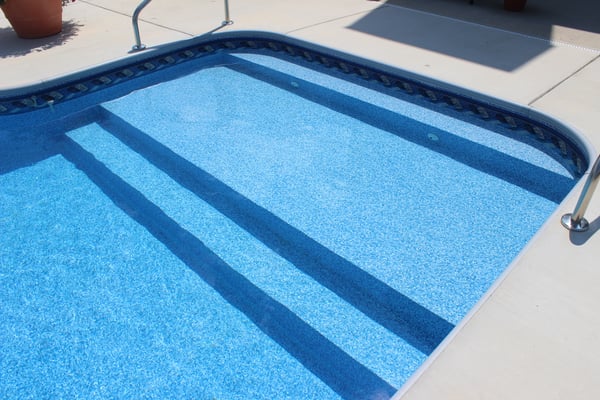
Adding a light and returns to these step/sun ledge designs is very beneficial for several reasons. Lighting illuminates the step area that would normally be dark, since the pool light would usually be lower than the steps and therefore would cast a shadow on them. Since sun ledges wouldn’t be the typical stepping pattern that we’re accustom to with stairs, having the additional lighting provides another level of safety. Returns will help keep the steps clean and the chemicals adequately circulated for sanitation reasons as well as reducing the risk of damage from chlorinated water in a small area.
Swim Outs
A swim out is a deep end entry usually in the form of a bench or seating option. There are a variety of types and colors available including those with or without jets! This area becomes a popular hangout space for those enjoying the pool from the inside as well as a place to dip your feet in and sit along the edge. Swim outs also offer an alternative entrance and exit point for swimmers without having to venture down to the shallow-end steps. Don’t get us wrong, those looking to extend their swim time will still choose the longer route when told that it’s time to get out of the pool. Different type and colors available with or without jets. However, keep in mind that jets will help keep this area clean, just like with regular steps, so it they are recommended.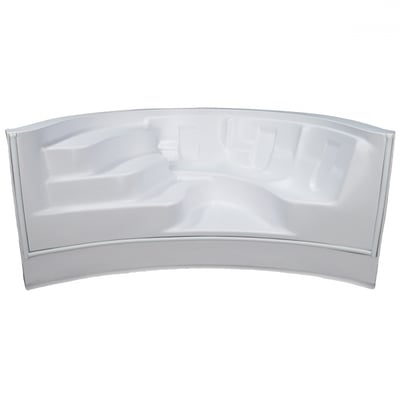
We hope that this helps you feel more confident when sorting through the different design elements surrounding your steps and pool entryways. If you still have questions, reach out to a Royal team member and we’ll be happy to “step” up to the challenge and help you out!


.jpg?width=700&name=pool%20essentials%20POOL%20LINERS%20(option%202).jpg)


